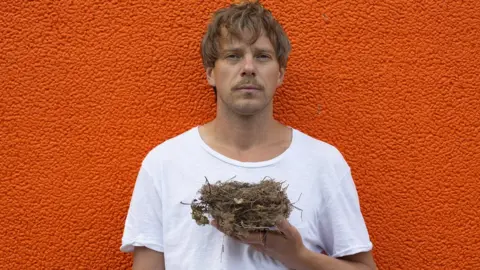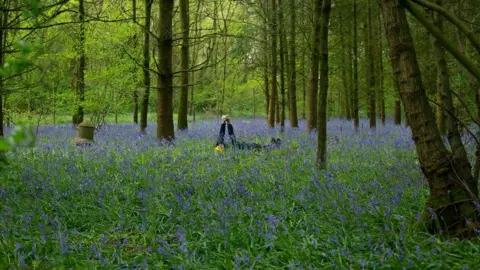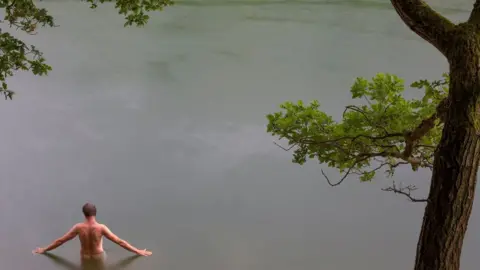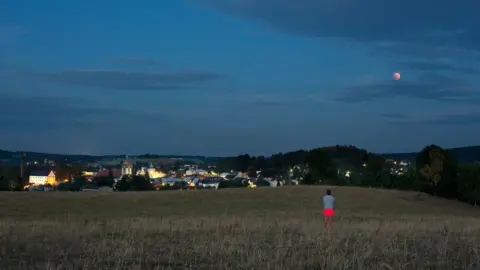'Go home Polish' graffiti prompts photographer's 1,200-mile walk
 Michal Iwanowski
Michal IwanowskiWhen photographer Michal Iwanowski, 41, came across some graffiti in Cardiff that said, 'Go home, Polish,' he decided to take it literally. Here, in his own words, he tells how and why he embarked on the 1,200 mile walk from Wales back to his country of birth.
I still remember seeing the graffiti. It was only small, but I was taken aback: "Go Home Polish".
I had lived in Cardiff for many years and considered Wales my home.
But I was also Polish, so I began to question whether I was at home or not, and where, in fact, home was.
I had never felt any negativity towards me in Wales. I found the people warm and welcoming.
But after Brexit, I felt a change in mood - not towards me but towards immigrants in general.
I felt some people were dehumanising "the other" and the concept began to terrify me. How could people turn on each other like this?
 Michal Iwanowski
Michal IwanowskiIt was then I began planning my walk, setting off on 27 April 2018 with a rough route map and a 15kg backpack.
Carrying British and Polish passports, I often wore a T-shirt bearing the word "Polska" so people would know I was Polish.
I walked over the bridge into England, then took the Pride of Britain ferry to France.
From there I walked through Belgium, Holland, Germany and the Czech Republic before reaching Poland.
Along the way, I told people what I was doing and why, to see what reaction I would get.
It was almost always positive. People shared their own stories, their own hopes and fears, their worries about their lives and situations.
Only once was I shouted out, when I wandered onto an allotment in Germany to ask a man for directions.
I began to realise that on an individual level, we have so much in common.
 Michal Iwanowski
Michal IwanowskiMuch of the walking was enjoyable, whether it was through Brussels or Cologne, or thwacking through bushes and wild forests of Germany.
I would stay in Airbnbs, wild camp or sometimes stay with strangers, who would often offer me food.
But, as I was walking in the summer, I was hit by the Europe-wide heat wave, and began to find my mission unbearable.
I ended up low on energy and electrolytes.
At one point, I remember throwing my backpack in the bushes and just wanting to give up, which is unusual for me as I am an upbeat person.
In the end, I sat there for about two hours, then got up again and continued the walk.
In total, it took me 105 days to arrive in my home village of Mokrzeszów in western Poland.
By the end, I was in survival mode. I was reclusive and refused company.
I walked up my home street and, as I did, a group of my relatives slowly walked out to meet me carrying a "welcome home" banner.
It felt like a funeral procession. It was very surreal.
Of course, it didn't feel like an achievement at the time.
Plenty of people walk long distances.
 Michal Iwanowski
Michal IwanowskiBut, looking back, it feels like I have achieved something. The walk helped me to solidify my views on "home".
I felt utterly at home walking across the breadth of Europe's landscape.
I don't need to be told by a person or government where my home is and isn't.
I belong to the ground beneath my feet, not to any country where I happen to have a passport and, as we move towards Brexit, there needs to be compassion and empathy as the meaning of "home" will change for many people.
There is still anti-Polish and anti-immigrant graffiti, of course - much worse than what I saw - and I deplore it every time I see it. We must never tolerate racist language.
But I need to put away my cynicism, and remember - as my walk showed me - that most people are generous and most people are good.
• Michal Iwanowski's exhibition, Go Home, Polish runs until 2 November at Galeri, Caernarfon
